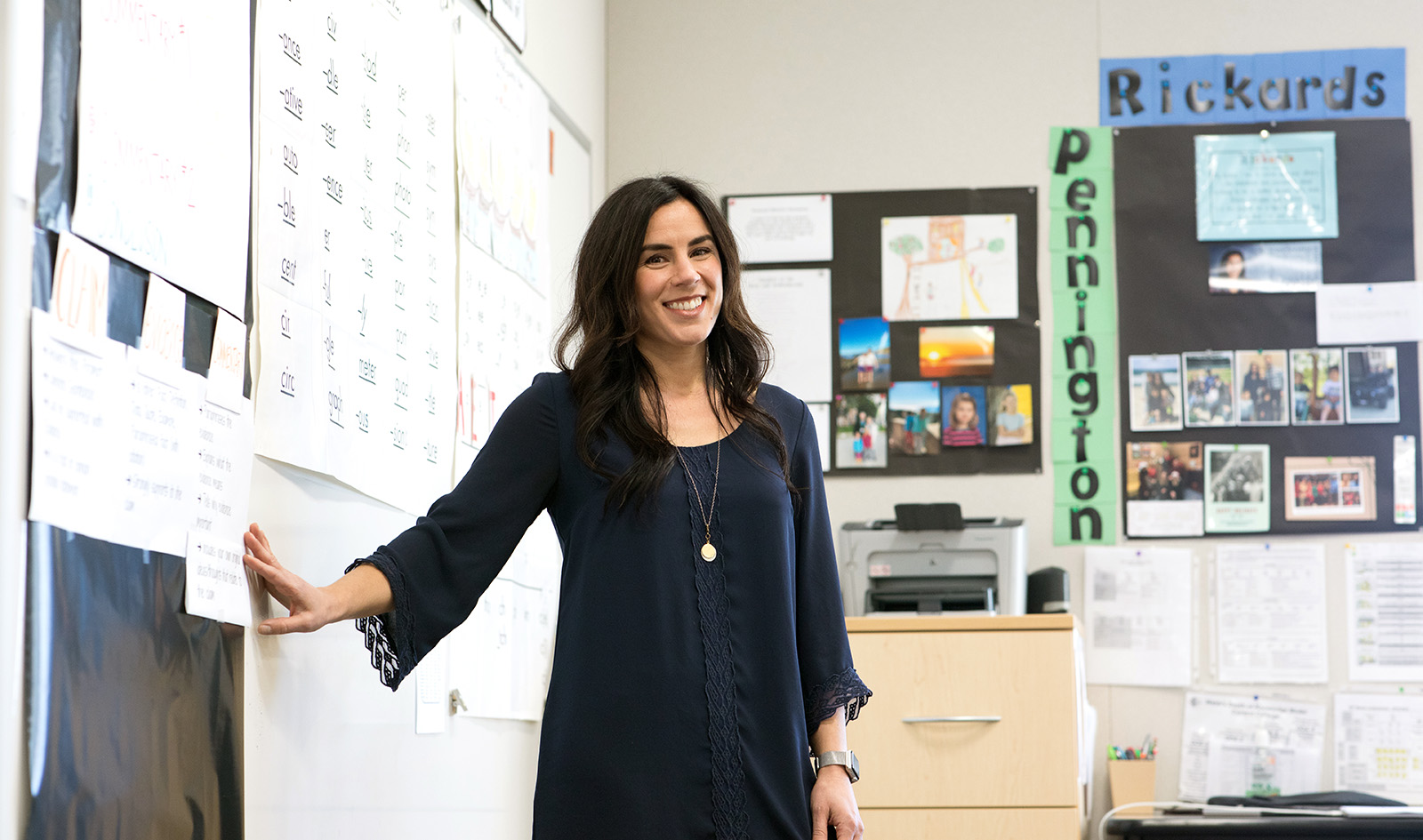

When Teaching Is a Calling
Sense of mission helps drive Sac State-trained educators
Jonathan Morales
Passion for learning, a drive for excellence, belief in their mission, deep pools of knowledge— these are what educators who are Made at Sac State share in the classroom and beyond.
Jen Rickards
"I had taken a science course in my undergrad that made science come to life with practical, engaging demonstrations. At the time, I was so excited by each lab that I could easily see myself doing them with my students. I was so excited to help kids explore science with the methods I had learned at Sac State.”
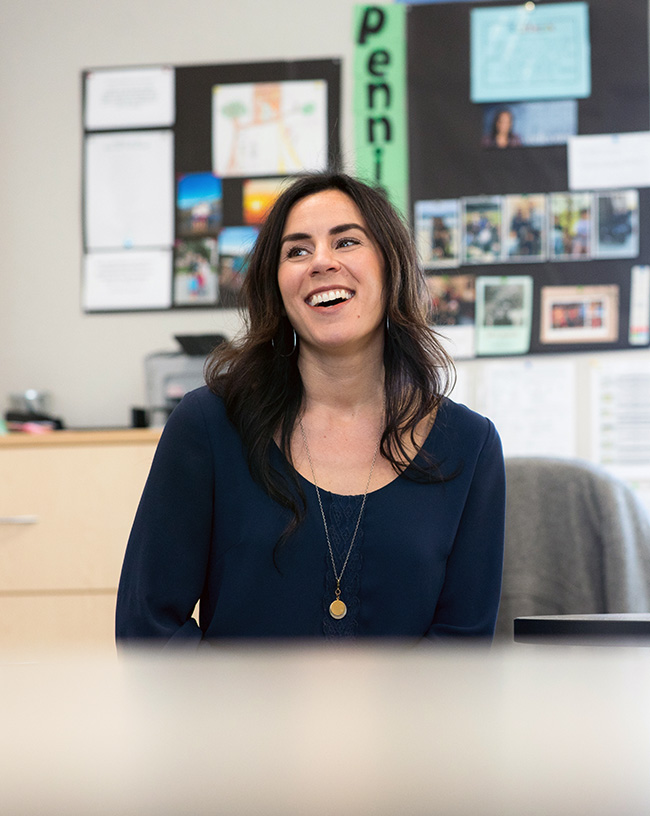
Jen Rickards, BA ’03 (Liberal Studies), Credential ‘05
NP3 charter school
Photo by Andrea Price
Jen Rickards knew she wanted to be a teacher from the moment she first walked into a classroom at age 5.
“I thought it was the happiest place on Earth,” says Rickards ’03 (Liberal Studies), Credential ’05. “I loved the smell of pencils. I loved the music. I loved the pretend playhouse. I loved everything about it, especially my first teacher.”
When she walked into her own classroom as a newly minted teacher two decades later, she experienced a very different – but no less joyous – emotion: “The students left, and I sat and cried because I couldn’t believe that my first day as a teacher had just happened.”
Thousands of teachers throughout the Sacramento region and beyond got their start at Sac State, where Rickards earned her undergraduate degree and credential. She is among countless teachers, administrators, counselors, and other educators who were “Made at Sac State” and are making differences in students’ lives.
“The Sacramento region is on the rise, and education is the engine of any local economy,” says Alexander “Sasha” Sidorkin, College of Education dean. “As the largest and longest-serving producer of educators in the region, we have a critical role to play in the region’s continued growth.”
Providing an exact number of Sac State alums teaching
in local districts is difficult, but California State University (CSU) figures indicate the impact is substantial: In 2015-16, the most recent year for which information is available, nearly half of California’s newly credentialed teachers came from a CSU campus. Nearly 8 percent of teachers nationwide graduate from a CSU.
Sac State’s College of Education, by nature, is slightly different than the University’s other academic colleges. It offers undergraduate programs in child development and American Sign Language, but the bulk of its offerings are postgraduate: teaching credentials, master’s programs, and the Doctorate in Educational Leadership program.
From 2014 through 2018, 2,267 students graduated from the College of Education with some type of educator credential, including 1,391 with teaching credentials. That’s in addition to the many more who graduate with bachelor’s, master’s, and doctoral degrees from the college.
Many teachers, such as Rickards, are two- or even three-time Sac State alumni, earning bachelor’s and postgraduate degrees or credentials. There also is a strong bond between the college and community: The bulk of Sacramento State students, including education students, come from the Sacramento region, and when they graduate, they live and work locally.
That local connection makes a difference, says Hornet alum Chris Evans, superintendent of the Natomas Unified School District. In 2015-16 and 2016-17, 31 percent of the district’s new hires were Sacramento State graduates, the largest percentage from any university or credentialing program.
“Not all of them are from Sacramento, but many of them have spent some time here, and that helps,” Evans says. “The vast majority will live in the Sacramento region.
“Sac State does a good job of emphasizing the diversity of our city and respecting that diversity and seeing it as a strength.”
Rubén González
“Going into education I realized that I wanted to help make an impact in the lives of young people, particularly students of color from low-income neighborhoods. ... My goal of becoming a teacher was to try to become an advocate for, and with, students, particularly students who are often overlooked.”
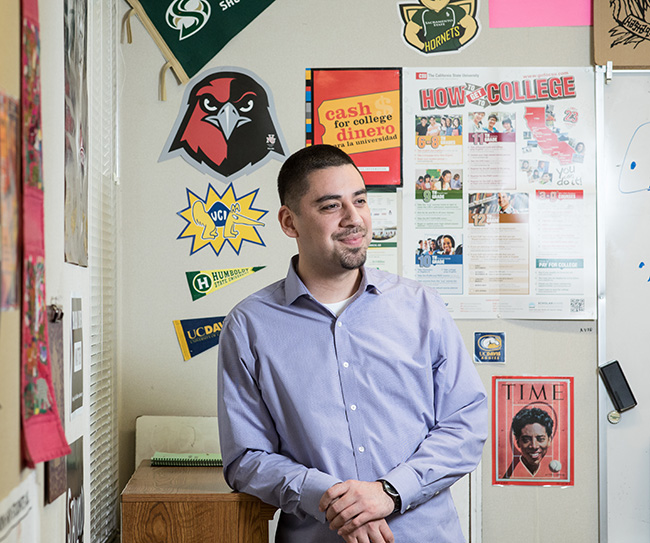
Rubén González, BA ‘13 (English), Credential ‘14, Florin High School
Photo by Andrea Price
A multifaceted college
Included in the college’s mission is a desire to prepare “educators, counselors, and leaders to serve as agents of positive social change,” something that consistently comes up in conversation with teachers who graduated from Sacramento State.
The college’s credential program “has a focus on social justice, equity, anti-racism, and eliminating the various forms of social oppression that plague our young people,” says Rubén González, a ninth and 11th-grade English and AVID – Advancement Via Individual Determination – teacher at Florin High School in South Sacramento. “That prepared me not just to be a classroom teacher, but also an advocate for students beyond the classroom.”
González – “Mr. G” to his students – was inspired to teach after witnessing firsthand how the education system was ill-equipped to respond to the needs of young people of color. Growing up in Greenfield, outside of Salinas, he was kicked out of high school his sophomore year and put on the “non-college track.” Despite that setback, he made it to Sacramento State after transferring from Hartnell College and became a committed advocate for young people, working with local K-12 students in migrant families through the University’s College Assistance Migrant Program.
González also leads an after-school program that helps students identify problems facing their communities, research solutions, and put them into action. In one case, after finding that students in wealthier areas had access to buses, the group collected data, presented it to the school board, and secured bus funding for underserved areas.
“You have to be that change agent and work to support students and work with students to make changes in society,” González says. “That’s one of the lessons I learned in the credential program.”
Malika Hollinside
“The art of teaching extends far beyond the transmission of academic content. It is our responsibility to ensure that young people are prepared not only academically but mentally, emotionally, and physically to make a successful and transformative impact on this world.”
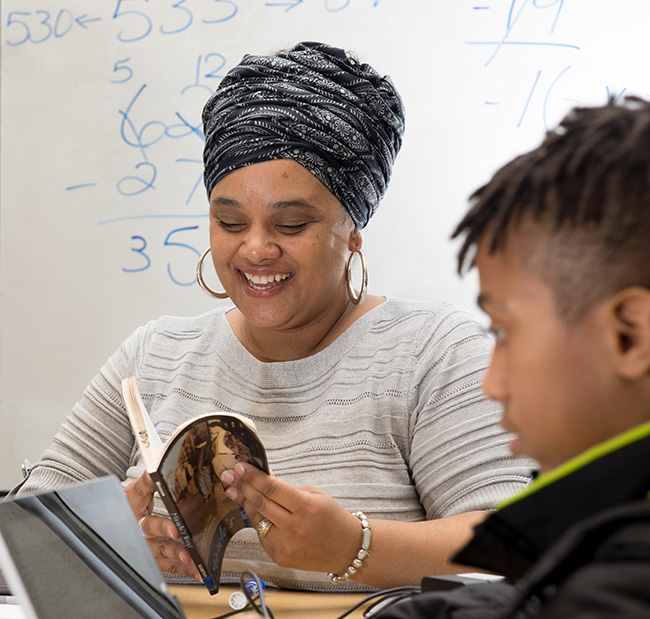
Malika Hollinside, BA ‘04 (Ethnic Studies), MA ‘13 (Bilingual and Multicultural Education), Ed.D. ‘17, Heritage Peak Charter School
Photo by Andrea Price
Malika Hollinside ’04 (Ethnic Studies), MA ’13, Bilingual and Multicultural Education, Ed.D. ’17, began those lessons early at Sacramento State as an undergraduate majoring in ethnic studies. Working at an
inner-city summer camp at age 16 opened her eyes to inequities faced by kids in that neighborhood and their need for advocacy and support.
Bachelor’s degree in hand, Hollinside became a substitute and eventually a full-time teacher. She soon realized, however, that she wanted to do more and returned to Sac State to earn her master’s degree and, ultimately, her doctorate.
At Sacramento State, she found professors who were “critical educators” – always willing to challenge the status quo and push equity issue boundaries.
“I was inspired by my ethnic studies experience at Sacramento State,” Hollinside says. “I wanted to bring that curriculum into schools, and I realized that my power was limited as a teacher. I wanted to have more influence.”
Hollinside now teaches high school at Heritage Peak Charter School in West Sacramento and is an adjunct professor at the Fortune School of Education. She has been involved with, among other things, curriculum development, student assessment, and supervision of student-teachers. She also is creative director and co-founder of Sisters of Nia, a nonprofit after-school program for young women of color, as well as a Sac State adjunct professor.
“Sacramento State is where I developed my teaching philosophy and formed the foundation of everything I do with my students,” Hollinside says. “Through ethnic studies and the professors I had during my graduate studies, I developed an understanding and appreciation for the people we share our community with.”
Sacramento State impact extends beyond classrooms. Many of the region’s administrators and other educators – principals, counselors, and more – are Hornet alumni.
Kristin Wright
“I feel very passionate about kids with disabilities getting a great education and making sure they are fully included in their schools and communities. And because I’m walking through it with my own kids at the same time, it’s been extra relevant to me.”
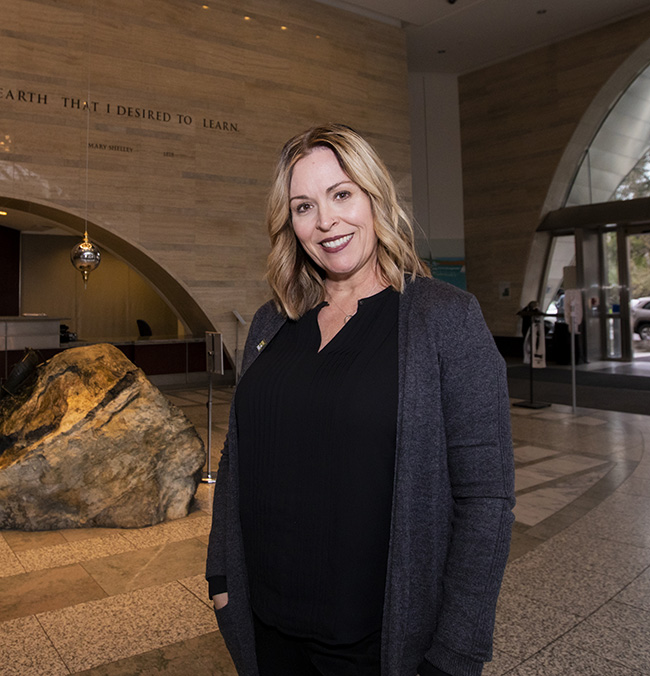
Kristin Wright, BA ‘07 (Sociology), Credential ‘10, MA ‘12 (Special Education)
Director of Special Education, California Department of Education
Photo by Jessica Vernone
Sometimes it feels like family
For Kristin Wright ’07 (Sociology), Credential ’10, MA ’12 (Special Education), director of special education for the California Department of Education, the connections to education and Sacramento State run deep. Her parents met while Sac State students, and both became teachers in Sacramento. As the mother of a daughter with significant disabilities, her work is deeply personal.
“Sac State grounded me in the fundamentals of equity and inclusion for students with disabilities,” Wright says, regarding the University’s special-education programs. These emphasize “inclusive education” in which students with disabilities are taught in general classrooms when possible.
“It’s really about operating from a foundational belief that all kids can learn and all kids belong, and then from there you put the supports in place to make that happen.”
Wright received her undergraduate sociology degree, education specialist teaching credential and master’s degree in special education at Sacramento State. Her sociology classes provided a solid foundation in conducting research and developing evidence-based solutions, useful in her current role.
At the Department of Education, Wright oversees a staff of about 150 whose job is to monitor and provide technical assistance and resources to school districts, county offices of education, and charter schools to support California’s approximately 795,000 students with disabilities. The core of their work is to uphold the tenets of the Individuals with Disabilities Education Act and ensure that schools meet the diverse needs of students with disabilities.
Wright’s family connection to Sacramento State has continued: Her daughter, Shelby, through Competitive Integrated Employment, works in the College of Education office, where Wright says “staff and students have been very welcoming and supportive.”
“We are always looking for ways for Shelby to be included in all aspects of our greater community,” she says. “We look to Sac State to be another one of those places where all are welcome. I have good feelings about Sac State.”
The connections made at Sacramento State and the sense of community among alumni, faculty, and staff continue to pay dividends, says Rickards. She now works as a literacy coach at NP3 charter school in Sacramento’s Natomas neighborhood, after previously working as a kindergarten, first-, fourth-, and eighth-grade teacher in the Sacramento City Unified and Natomas Unified school districts.
Faculty who were her mentors at Sacramento State now are close friends who also bring new student-teachers to her classroom and school. Those student-teachers, in turn, become friends and colleagues.
“You continue to grow professionally, and you continue to be a community that is into sharing knowledge, sharing the latest best practices in instruction,” Rickards says. “The relationships I got to have with professors were and still are so huge.”
It’s a long way from a childhood spent teaching a classroom full of stuffed animals, dreaming of the day she’d be doing the real thing. The dream became reality at Sacramento State.
“All kids have a desire to learn … sometimes they just need to be inspired and engaged while doing it. It’s our job to find the methods that will motivate them to be inspired,” Rickards says.
“My core values as an educator, those were certainly developed from the teaching I got at Sac State.”
